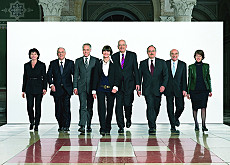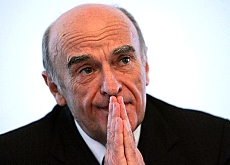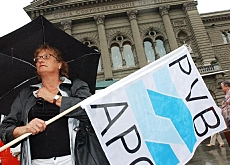Cabinet considers whether to make changes

The Swiss cabinet will be meeting on Wednesday to discuss whether to make changes to how its ministries are organised.
In particular, ministers will be debating the education and security portfolios. But despite pressure for change, experts say the government is reluctant to alter the status quo.
The seven-member Swiss government is in many ways unique in Europe. All ministers share power equally and all four main political parties are represented.
For many years it was considered an efficient way of governing, but in the 1990s doubts were raised about whether it could really tackle issues in a coherent and innovative way.
One of the main problems was considered to be the size of the ministries.
The interior ministry, for instance, has a particularly large remit – health, education, culture and social security. And the energy, environment, transport and communications minister has to deal with areas that are normally split into separate ministries in other European countries.
All previous attempts to change the situation – mostly from parliament – have come to nothing.
“The stability of the balance of power has ended up stopping reforms,” said Frédéric Varone, a political scientist at Geneva University. “All the forces in government have been afraid that they have something to lose.”
Ideas rejected
Over the past decades, several proposals to change the system have foundered.
A plan to create a two-tier government, with the cabinet in charge of strategic decisions and state secretaries running various sectors of the administration, was thrown out at the ballot box in 1995.
Other ideas have included having more ministers or giving more power to the president – currently a rotating, one-year role.
But the civil service has seen some change since a new law drawn up in 1997 gave cabinet the power to reorganise its administration.
This resulted a year later in the transport and energy ministry being given the environment mandate, and the defence ministry gaining the sport portfolio.
This latest impulse for change – nearly ten years on – has also come from parliament.
“Paradoxically, parliament, which renounced its powers over reorganising the administration with the 1997 law, now seems to want to take the situation in hand,” observed Varone.
Calls for change
Parliament has already called for the creation of an education ministry. Discussions have also focused on incorporating the army, federal police and border guards into a sole security ministry and reorganising the development aid structure.
The problem lies above all in ensuring that certain sectors of the administration are grouped together in a rational way.
“But you cannot disregard the political dimension,” warned Varone.
“Moving unemployment benefit from the economics ministry to that of the interior to create an education and innovation ministry shows a particular political vision.”
The present transport minister, Moritz Leuenberger, who was charged last year while president to look into the matter, has already admitted that the outcome is likely to be the maintaining of the status quo.
His tentative proposals have already come up against stern opposition from Interior Minister Pascal Couchepin and Justice Minister Christoph Blocher.
“In the end it will be about moving around some offices within the administration,” said Varone. “This won’t guarantee a better political management of the country.”
swissinfo, based on an Italian article by Andrea Tognina
The cabinet is made up of seven ministers. One member takes the largely ceremonial role of president on a one-year rotating basis.
The four main political parites, – the Radicals, the Christian Democrats (both centre-right), the rightwing Swiss People’s Party and the centre-left Social Democrats – have been represented in the cabinet since 1943.
Between 1959 and 2003 the Radicals, Christian Democrats and Social Democrats had two seats in the cabinet, while the People’s Party held just one. Four years ago Christoph Blocher won an additional seat for his People’s Party at the expense of the Christian Democratic Party.
The ministers have wide-ranging portfolios.
The interior minister is in charge of health, culture, education (partly) as well as social security.
The transport minister also has the title of energy, communications and environment minister.
The economics minister is responsible for foreign trade, labour and agriculture as well as vocational training and technical aid to developing countries.
The justice minister is also in charge of federal police matters, while the defence portfolio includes sport.
The finance minister is also head of the federal personnel office.
The foreign ministry includes diplomatic matters as well as development aid.

In compliance with the JTI standards
More: SWI swissinfo.ch certified by the Journalism Trust Initiative


You can find an overview of ongoing debates with our journalists here . Please join us!
If you want to start a conversation about a topic raised in this article or want to report factual errors, email us at english@swissinfo.ch.